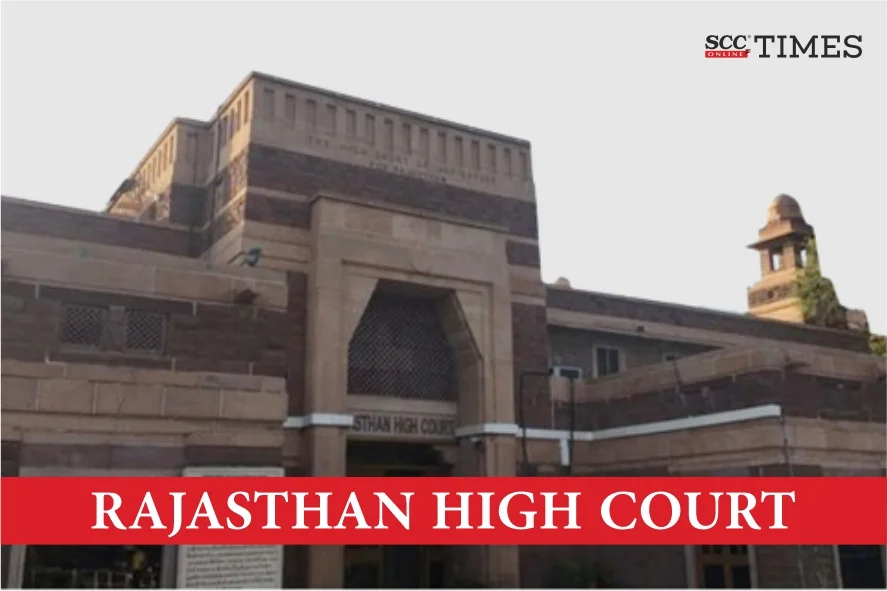Rajasthan High Court: In a writ petition filed by a female conductor employed by the Rajasthan State Road Transport Corporation (RSRTC) seeking extension of maternity leave to 180 days, arguing that other similarly situated employees in different sectors were granted such leave, a single-judge bench of Anoop Kumar Dhand, J., held that the petitioner is entitled to 180 days of Maternity Leave like the other female employees working under the Service Rules, applicable to the State and Central Government services and to woman employee, falling under the purview of, 2017.
“Women contribute to half of the segment of our society and they have to be honoured and treated with dignity at all places, including where they earn their livelihood. Whatever be the nature of the duties, in the place where they work, they must be provided with all facilities to which they are entitled for.”
Factual Matrix
In the instant matter, the petitioner, a female conductor employed by the Rajasthan State Road Transport Corporation (RSRTC), became pregnant during her employment. She applied for 180 days of maternity leave but was granted only 90 days as per Regulation 74 of the RSRTC Employees Service Regulations, 1965.
The petitioner contended that the Maternity Benefit Act, 1961, amended in 2017, extends the period of leave to 26 weeks (180 days) for all women employees, but, despite this provision, the petitioner was granted only 90 days of maternity leave, which is discriminatory and inconsistent with broader norms applied to other government employees.
On the other hand, the respondents argued that the RSRTC had complied with the Regulations of 1965, which provide for 90 days of maternity leave, and no illegality had been committed. The respondents contended that the regulations governing RSRTC employees, in this case, limited the leave to 90 days, and the petitioner could not claim more under these regulations.
Moot Point
-
Whether the petitioner is entitled to 180 days of maternity leave, despite the 90-day cap in RSRTC regulations?
-
Whether granting only 90 days of leave constitutes discrimination against the petitioner when compared to other similarly situated employees in different services?
Law Point
-
Maternity Benefits Act, 1961, initially provided for 12 weeks (90 days) of leave, which was increased to 26 weeks (180 days) in 2017.
-
Regulation 74 of the RSRTC Regulations, 1965, provides for 90 days of maternity leave for women employees.
-
The Rajasthan Service Rules and Central Civil Services (CCS) Rules provide for 180 days of maternity leave.
-
The Supreme Court in MCD v. Female Workers (Muster Roll), (2000) 3 SCC 224 and Bandhua Mukti Morcha v. Union of India, (1984) 3 SCC 161, upheld the constitutional right to maternity leave as a fundamental right under Article 21.
Court’s Analysis
The Court emphasised on the importance of maternity leave in protecting the health and well-being of both mother and child, free from the pressure of work. The Court stated that “ensuring the health of both the mother and her newborn is vital, not just for the child’s development but for the nation’s future. Today’s children will drive tomorrow’s progress.” The Court stated that denying essential benefits to mothers and their infants equates to denying the nation its potential. The Court asserted that “Maternity Leave is not just a benefit but a right that supports the fundamental need of a woman to take care of her family.”
The Court examined the legal framework, including the RSRTC’s Regulation 74, Rajasthan Service Rules, CCS Rules, and amendments under the Maternity Benefit Act of 2017. The Court acknowledged that maternity leave is not only a statutory right but also a fundamental right under Article 21 of the Constitution of India, which guarantees the right to life and dignity. The Court further asserted that this right includes the right to maternity leave for all women, regardless of the nature of their employment.
“Maternity Leave benefits are not just statutory entitlements but fundamental rights that reflects a woman’s identity and dignity when she decides to start a family. The right to bear children is protected under Article 21 of the Indian Constitution as part of the Fundamental Right to Life and Personal Liberty.”
The Court referred the Female Workers (Muster Roll) case (Supra), where the Supreme Court emphasised that maternity leave is a matter of women’s dignity and equality, which cannot be compromised and extended maternity benefits to muster-roll workers, invoking the Doctrine of Social Justice, and Bandhua Mukti Morcha (Supra), where the Supreme Court recognised maternity benefit as an essential aspect of the right to live with dignity under Article 21 of the Constitution of India.
The Court stated that “the State is obligated to ensure that pregnant working women receive all necessary support and protection for their health and that of their child while maintaining their employment.” Given the evolving legal framework, the Court opined that denying 180 days of maternity leave to the petitioner, is not only discriminatory but also violative of their fundamental rights, contained under Articles 14 and 21 of the Constitution of India, as women in other departments receive the same benefit. The Court recognised maternity leave as an essential welfare measure and a fundamental right under Article 21.
“Denial of 180 days of Maternity Leave to the female employees working at RSRTC, like the petitioner, undermines a woman’s right to child birth and Maternity Leave, as provided under the Act of 1961 (as amended in 2017).”
Court’s Decision
The Court held that the petitioner, as a woman employee of RSRTC, is entitled to 180 days of maternity leave in accordance with the provisions under the RSR, CCS Rules, and the Maternity Benefit (Amendment) Act, 2017. The Court directed the RSRTC to grant the petitioner 180 days of maternity leave.
[Minakshi Chaudhary v. Rajasthan State Road Transport Corporation, 2024 SCC OnLine Raj 2779, Decided on 05-09-2024]
Advocates who appeared in this case :
Mr. Ram Pratap Saini and Mr. Aamir Khan, Counsel for the Petitioner
Mr. Puneet, Counsel for the Respondents







